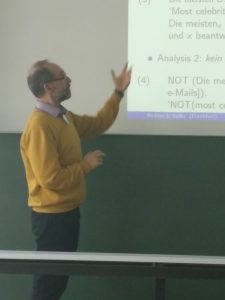This year’s annual meeting of the German Lingusitic Society (DGfS) hosted a workshop on One-to-many relations in morphology, syntax, and semantics, organized by Berthold Crysmann (Paris). The workshop comprised a number of presentations by members of the IEAS-LLF network One-to-Many (2017 & 2018).
The workshop consisted of 18 presentations, including invited talks by Andrew Spencer (Essex) and Hedde Zeijlstra (Göttingen). There were three talks involving members of the IEAS:
Sascha Bargmann, Berit Gehrke (Paris) & Frank Richter: How to modify idioms.
This talk was a reworked and adapted version of their presentation at the Szklarska Poreba workshop a few weeks ago. They presented naturally occurring examples of so-called conjunction modification of idioms. Again, the data they discussed were novel and challenging. There was a fruitful discussion, particularly stimulated by Jamie Findlay’s talk on Conspiracy theories: the problem with lexical approaches to idioms.
Olivier Bonami (Paris) & Gert Webelhuth: Periphrasis and morphosyntactic mismatch in Czech
Olivier and Gert discussed Czech clitic tense auxiliaries from a pradigmatic perspective. They motivated the concept of zero-exponence in periphrasis and provided a formal analysis, building on their earlier work on periphrastic constructions.
Their talk had interesting relations to Andrew Spencer‘s invited talk, which presented a different view on periphrasis.
Frank Richter & Manfred Sailer: Negation marking in conjuncts: A one-to-many relation?

Frank and Manfred looked at coordination of negated noun phrases as Alex read no book and no article. They provide an analysis in Lexical Resource Semantics, building on their previous work on negation and providing a simple account of plural and conjunction. Frank’s and Manfred’s talk directly related to the talk by Jovana Gajić (Göttingen) who was looking at negative conjunction particles (neither … nor) in a variety of languages.
The workshop was held in a stimulating and supportive atmosphere and perceived as a forum for a very fruitful exchange of ideas.
Links
- Page of the network: One-to-many correspondences
- Frank’s and Manfred’s slides
- Deutsche Gesellschaft für Sprachwissenschaft
